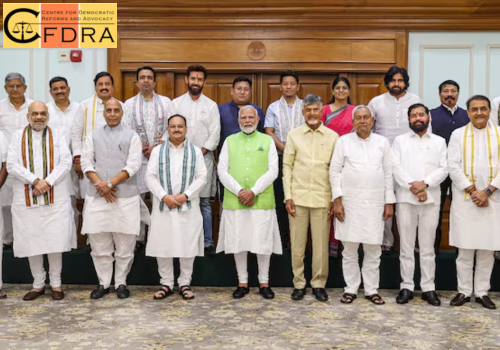Centre Optimizes 8 Cabinet Panels, NDA Partners Elevated to Key Bodies

The Centre has undertaken the optimization of eight Cabinet panels, significantly elevating partners from the National Democratic Alliance (NDA) to prominent roles within key decision-making bodies. This restructuring underscores a proactive approach to harnessing diverse expertise and perspectives in shaping policy and governance frameworks crucial to India’s development trajectory. By integrating NDA allies into pivotal committees, such as the Cabinet Committee on Economic Affairs (CCEA) and the Cabinet Committee on Political Affairs (CCPA), the Centre aims to foster inclusive decision-making, strengthen coalition dynamics, and ensure robust governance across critical sectors.
Stability and Continuity: Unchanged Core Committees
Despite the reconstitution, certain core Cabinet committees remain unchanged to maintain stability and consistent leadership. The Cabinet Committee on Security (CCS), chaired by Prime Minister Narendra Modi and comprising key ministers like Rajnath Singh, Amit Shah, Nirmala Sitharaman, and S. Jaishankar, retains its composition. Similarly, the Appointments Committee of Cabinet (ACC), headed by Prime Minister Modi and including Home Minister Amit Shah, remains unchanged, underscoring the importance of continuity in decision-making processes.
Expansion of Influence: NDA Allies in Key Committees
A notable development in the reconstitution is the inclusion of NDA allies in pivotal committees such as the CCEA and CCPA. In the CCEA, HD Kumaraswamy, Minister of Heavy Industries and Steel from the Janata Dal (Secular), and Lalan Singh, Minister of Panchayati Raj and Animal Husbandry from the Janata Dal (United), have been appointed as members. This marks the first major restructuring of these key panels since the 2019 Lok Sabha elections, reflecting a strategic move to broaden representation and incorporate regional and sectoral expertise into decision-making processes.
Historical Context and Significance
The last time a Bharatiya Janata Party (BJP) ally was part of the CCEA was in August 2020, with Akali Dal leader Harsimrat Kaur Badal. The current reshuffle not only ensures broader participation but also underscores the government’s commitment to inclusive governance and coalition dynamics. By integrating NDA allies into these critical committees, the Centre aims to leverage diverse perspectives and strengthen collaborative efforts in addressing national priorities and challenges.
Focus Areas: Policy Formulation and Strategic Decision-Making
Each of the reconstituted Cabinet committees focuses on specific domains crucial to India’s development agenda, ranging from economic policies and political strategies to security and appointments. The inclusion of NDA allies is expected to enrich discussions and policy formulation processes, ensuring that decisions reflect a comprehensive understanding of regional, sectoral, and national imperatives.
Strategic Implications: Enhancing Governance Effectiveness
The strategic placement of NDA partners in key committees signifies a proactive approach to governance, emphasizing agility, responsiveness, and stakeholder engagement. This restructuring is aimed at enhancing governance effectiveness by fostering consensus-building, promoting transparency, and optimizing resource allocation across sectors. It also reinforces the government’s commitment to aligning policy priorities with emerging challenges and opportunities in a rapidly evolving global landscape.
Future Directions: Building on Collaborative Momentum
Looking ahead, the reconstitution of Cabinet committees sets the stage for sustained collaboration and strategic alignment within the NDA coalition. It underscores a commitment to continuity and adaptability in governance, ensuring that India remains resilient and responsive to socio-economic dynamics and geopolitical shifts. By harnessing the collective strengths of coalition partners, the Union Government aims to drive inclusive growth, foster innovation, and uphold national interests on both domestic and international fronts.
Conclusion
The Union Government’s decision to restructure eight Cabinet committees with the inclusion of NDA allies marks a significant step towards fostering inclusive governance and enhancing decision-making capabilities. By expanding participation and integrating diverse viewpoints into key policy discussions, the reconstitution aims to strengthen coalition dynamics, promote consensus-driven governance, and deliver impactful outcomes for the nation. As these committees begin their work under new configurations, the focus remains on leveraging collective wisdom, fostering sustainable development, and steering India towards a prosperous future.


